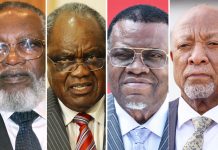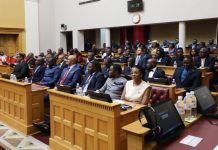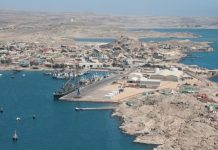By Micah Reddy and Warren Thompson
25 November 2024

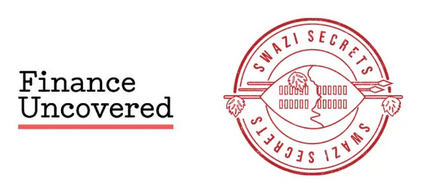
Leaked documents from the Eswatini Financial Intelligence Unit (EFIU) reveal how, in late 2018, the kingdom’s authorities began secretly investigating suspicious payments amounting to tens of millions of rands between entities linked to two politically connected businessmen.
The investigation raised red flags regarding the relationship between Keenin Schofield, son-in-law to King Mswati III, and a Dubai-based businessman, Alistair Mathias, who claimed to be a close friend of the king.
Mathias was accused in a 2023 Al Jazeera documentary of being one of the architects behind a vast scheme to smuggle gold out of Zimbabwe, allegedly with the complicity of the Mnangagwa regime.
The leaks reveal how millions of rands emanating from a Johannesburg, South Africa company named AMFS moved rapidly through entities controlled by Schofield and Mathias before ultimately being transferred to Dubai.
This raised suspicions within Eswatini’s authorities that the pair “might be using the country as a conduit for smuggling illegally obtained Gold out of Africa through Eswatini to the United Arab Emirates under the guise of a company,” and that this was being done to “conceal the true source and purpose of the funds received and transferred,” according to a letter the EFIU wrote to the country’s tax authority.
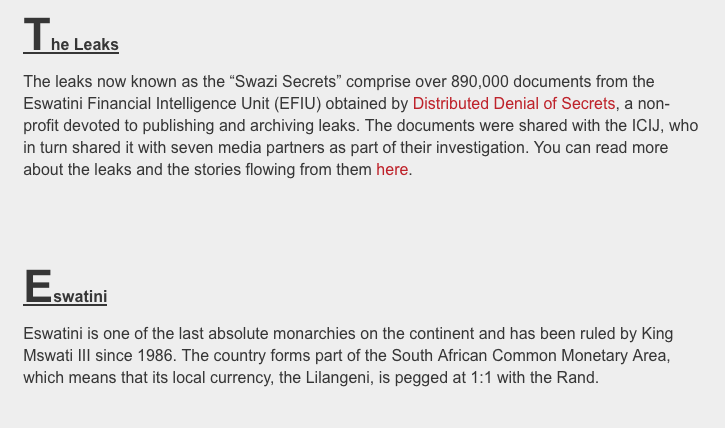
Back in 2018, Swazi jeweller Keenin Schofield appeared to be an up-and-coming businessman. His company, Schofield & Co. Custom Jewelers, was making a name for itself selling high-end custom watches and jewellery to a slew of wealthy celebrities. One of his more eye-catching Instagram posts shows Schofield delivering a diamond-encrusted pendant to World Cup winning midfielder Paul Pogba.
Less publicised, however, is Schofield’s run-in with the law. In 2009, aged 20, he was arrested for smuggling, pled guilty in a Zimbabwean court for illegal possession of diamonds and was fined US$400.
Also less visible are Schofield’s links to the Swazi royal family. There is very little public information on his marriage to Princess Temtsimba, one of the king’s daughters, but he confirmed the marriage to amaBhungane and said that he and the princess have two children.
Schofield says he met Mathias at some point during 2018.
Mathias was not widely known until last year, when Al Jazeera aired its undercover exposé on the so-called “Gold Mafia” operating in Southern Africa. In secretly recorded interviews with journalists posing as crooked businessmen, Mathias claimed to be one of the kingpins using gold to move and ‘cleanse’ cash on behalf of Zimbabwean clients.
In the interviews, Mathias hinted at a larger operation on the continent, telling Al Jazeera’s undercover reporters that he “moves” gold worth between $70 million and $80 million each month through Ghana and southern Africa to Dubai.
Mathias later denied to Al Jazeera that he had ever laundered money or traded illegal gold.
Putting the “Special” in Special Economic Zone
Schofield says that he and Mathias teamed up to build a large gold refinery in Eswatini’s newly created Special Economic Zone (SEZ), which was intended to be a major hub for commodity refining and trading. The SEZ was described as the “brainchild” of King Mswati III.
“I had met all the relevant stakeholders in Eswatini to get the licensing done … but I just wasn’t able to get it over the line in terms of raising enough capital,” Schofield told us.
That’s where Mathias came in. He would put up the money and was “leading” the project.
Schofield was to act as the local partner, by building relationships in Eswatini and introducing Mathias to “relevant people.” His own company, Schofield & Co., would be one of the “agents” that would buy finished gold products like gold coins from the new refinery and sell them on.
But far from being a landmark investment in Eswatini, the millions of rands that flowed through the companies of the two businessmen yielded nothing tangible. Instead, all it did was raise suspicions at the EFIU and Eswatini Central Bank.

The business relationship between the two developed quickly. According to Schofield & Co’s FNB bank statements, which we obtained through the leaks, Schofield travelled to Dubai in June 2018.
Cash flows
Upon returning later that month, Schofield’s business account received three large cash deposits amounting to R840 000 on the same day. All three deposits were made with the same reference: “Watches & Jewellery”. A few days later, Schofield & Co made a single payment of R740 000 to Mathias Holdings in Dubai.
Large cash deposits are particularly suspicious in the eyes of financial intelligence units, because cash is untraceable. Judging by the identical references used, the deposits appeared to be related, , underscored by the fact that when added up, these deposits amounted to a nice round number – exactly R840 000.
In money laundering parlance, the term “smurfing” is used to describe the practice of breaking a single transaction up into smaller transactions to avoid detection by authorities. Schofield’s company account had never before received cash deposits. Yet in one day, it received R840 000 via three separate transactions.
It seems that Schofield’s bankers at FNB immediately became suspicious. On 2 July, FNB’s in-house financial crime analyst sent an email to the EFIU containing Schofield & Co.’s company documents, which included earlier bank statements for the company. The EFIU had been alerted.
A similar sequence occurred a week later, on 11 July. Six cash deposits amounting to R1.68-million were made on the same day, at the same branch, to Schofield & Co’s account. This time each deposit came with a different reference, including “Rolex Presidential”, “Diamondstraponrolex” and “Diamond Setting.”
The next day, Schofield & Co. sent R1.54 million – almost all the money it had just received – to Mathias Holdings in Dubai.
In a matter of weeks, Schofield & Co. had received millions of rands, dwarfing all the money that had arrived in their bank account in the preceding nine months.
As soon as the money left for Dubai, the pattern repeated. On 13 July, six cash deposits amounting to R1.52 million, all with the reference “Stock Purchase”, were made on the same day before a single payment for over R2.5 million was sent overseas to Mathias Holdings after a delay of two weeks.
Alistair Mathias did not respond to requests for comment.
Schofield said that he did not recall the deposits when we raised them during our interview. He did not respond to subsequent follow up questions regarding the matter either.
There was a subsequent lull in the account for a couple of months before even larger amounts of money swept through it in November and December.
At the same time as cash was rolling into Schofield’s company account, seemingly destined for Dubai, the pair established a company named the Mint of Eswatini in which they were equal shareholders. This company immediately obtained a license to operate in the SEZ, which provided tax incentives. Schofield told us that he thought this would be the vehicle that would achieve his dream of developing a gold refinery in the country.
Enter AMFS
In November, instead of cash deposits, money began arriving in the account of Schofield & Co. via international transfers from an obscure company in Johannesburg named AMFS.
On 2 November, a single payment of nearly R6 million arrived with the reference “amfs”. On the same day, just over R5.3 million was wired to Mathias Holdings in Dubai. South Africa to Eswatini, Eswatini to Dubai. The money was moving faster than a jet.
“It’s never proof of anything, but I always think it’s a red flag when you have a company that receives and dissipates money immediately,” says Paul Holden, who assisted the Zondo Commission on state capture as an investigator. “Most legitimate companies hold on to some of their assets for reserves, they pay office costs. … They have all these extraneous expenses that reflect on their account, and you can tell an operating business’s account pretty quickly.”
Between the end of November and the middle of December, AMFS sent another ten transfers amounting to over R67 million to Schofield & Co. But this time, instead of going straight to Dubai, the money was transferred to the FNB account of the Mint of Eswatini, which then sent three international payments to Mathias Holdings in Dubai.

Despite the plans to build a refinery, which would entail significant costs in Eswatini, the millions arriving in the country were immediately sent to Dubai. Schofield claims that this was to pay for inventory like gold bars and coins. The volumes represented an enormous increase in the turnover through the account of Schofield & Co, which earlier in the year – before Schofield had met Mathias – would receive hundreds of thousands of rands a month.

Schofield says Mathias alone controlled Mint of Eswatini’s bank accounts, even though Schofield was a 50% shareholder and a director of the company.
Schofield said he thought the cash coming from AMFS was Mathias’ money, used to purchase gold inventory: “We were receiving it [the money] and the idea was that that was part of the investment,” he told us.

Schofield alleges that Mathias sent money to Schofield & Co., which then passed the money to Mint of Eswatini based on invoices Mathias generated for gold bars and coins.
Mint, in turn, sent the money to Mathias Holdings in Dubai, ostensibly for the purchase of gold products. This suggests that Mathias was paying himself through Schofield & Co and Mint of Eswatini, something that would appear to be highly inefficient.

A Central Bank of Eswatini letter from September 2019 asked: “why doesn’t Schofield and Company Jewelers directly purchase the gold bars from Mathias Holding FZC?”.
Mint of Eswatini added no markup to the transactions, according to the letter; it was merely a conduit for the money and supposed gold bars and coins.
Its bank account was opened days before it started receiving payments from Schofield & Co and, in January 2019, after a brief flurry of activity when the money from Schofield & Co. began pouring in, this account went dormant. FNB would later freeze Mint of Eswatini’s accounts.
The insertion of Mint of Eswatini into the chain of transfers from South Africa to Dubai via Eswatini could have been, according to the analysis of the EFIU, part of a “layering” pattern.
According to a recognised definition of money laundering, “layering” refers to attempts to hide or obscure the source of illicit money (money generated from criminal activity) through a series of elaborate transactions across different countries and entities.
On 20 December 2018, the EFIU sent a “Suspicious Transaction Report” to the country’s Anti-Corruption Commission to encourage it to look into the matter and, if necessary, investigate further.
The report provided a summary of the payments made in November and December, raising suspicions over “the manner in which all these transactions are conducted, especially receipts of huge sums of money, which were immediately disposed-of to one of the Directors company in Dubai”.
The EFIU was of the opinion that Mint of Eswatini could be involved “in some sort of criminality bordering around corruption and money laundering.”
When we put all this to Schofield, pointing out that the transactions bore the signs of money laundering and that he may therefore have been party to a crime, he replied:
“Definitely, I mean I can’t sit here and deny things, that would be stupid of me,” he said.
He pointed out that he was young at the time (29) and that, with the benefit of experience, probably would have recognised what was going on.
“Now that we can sit down and discuss it and talk it through, we can highlight all the problems and all the things that I didn’t see. But at the time I wanted to open up a refinery. As I say, Alistair came across as a person who was well ahead of my understanding of how the business actually functions. And I was kinda going along his lead,” says Schofield.
In January 2019 the two parted ways, according to Schofield, and Mint of Eswatini’s refinery was never built.
We don’t know where the money went after being transferred to Mathias Holdings in Dubai.
Holden says the city is among the “jurisdictions around the world which make money laundering incredibly easy, which are basically not compliant with anti-money laundering provisions and where it’s almost impossible to see those authorities collaborating in tracking illicit financial flows”.
Despite his newfound fame due to the Gold Mafia exposé, Mathias was not interested in responding to our lengthy set of questions. However, the letters “AMFS” on Schofield & Co’s bank statements provided a clue about the origin of the funds going through Eswatini.
The Big League
AMFS Solutions was little known in 2018, but soon began to attract notoriety following accusations of money laundering. The business was under new ownership, having been bought by Johannesburg-based businessman Carlo Stickling, who had acquired it from AMFS’s previous owner, Kalandra Viljoen, in November 2017 (amaBhungane previously set out some of the allegations concerning AMFS here and here).
At almost the same time AMFS began transferring money to Schofield & Co., records show that two new directors were appointed – Mohamed Khan and the since-deceased Sohail Jiwani.
As amaBhungane has previously reported, these two have, over several years, allegedly aided a variety of illicit financial operations by facilitating the expatriation of funds. This occurred most famously through Sasfin Bank, where their company SALT Asset Management was a broker representing several large clients. This most notably included Zimbabwean mogul Simon Rudland and partner Ebrahim Adamjee’s Gold Leaf Tobacco Corporation.
Mohamed Khan was also introduced to the public in the Gold Mafia exposé, in which he was accused of being one of the major money launderers in South Africa.
Quite why Khan and his business associate were purported directors of AMFS for roughly two-and-a-half months before abruptly resigning at the start of February 2019 remains a mystery.
Khan did not respond to any of our emails.
When we messaged Stickling to engage, he told us that he could not help and then promptly blocked us.
Prior to when AMFS began sending money to Schofield in Eswatini, its accounts had already been temporarily frozen in connection with allegedly receiving money from the looting of Namibia’s SME Bank.
In a tale eerily similar to that of VBS, the scale of the alleged theft and fraud perpetrated by SME’s executives led to its collapse.
The liquidators alleged that a portion of the millions of dollars stolen from the bank was laundered through AMFS, which they bluntly labelled “a money laundering machine”. A report by the EFIU noted the bad publicity around AMFS at the time.
A closer look at AMFS’s bank statements shows two names popping up repeatedly in relation to payments into the account: Northern Spark and JR Technical.
Both have previously been identified by the South African Revenue Service (SARS) as among the suppliers of gold in a massive alleged refund fraud perpetrated against SARS that ran to billions of rands. The SARS claims remain the subject of legal dispute.
It is unclear what to read into the appointment of Khan and Jiwani as directors of AMFS in this period. Bank statements continued to be directed to Stickling, who was reappointed as sole director shortly afterwards.
However, the fact that AMFS channelled money through Eswatini to Mathias in Dubai suggests that alleged money laundering networks in Southern Africa were more integrated than was initially thought.
Back to the present
Today, Eswatini’s SEZ lies largely dormant. The lots are filled with weeds and the wide roads are empty. The refinery was never built, and the only completed building on the vast property is a government office.
The paper trail in the leak does not shed light on where investigations by Eswatini authorities ended up. The last indication was in 2022, when the country’s Anti-Corruption Commission sent a progress report on investigations to the EFIU. Nearly four years after Mint of Eswatini was founded, Schofield and Mathias’s involvement in suspicious transactions was still listed as an “active investigation.” No further details were provided.
Schofield told us that Schofield & Co.’s company accounts with FNB were never frozen or closed, and that he never received a call from officials at the bank asking him about any of the transactions involving Mathias.
Mathias told Al Jazeera that he had never laundered money or traded in illegal gold. According to the staff at one upmarket hotel we spoke to, he still visits Eswatini often.
Neither Mathias nor his associate in Zimbabwe, Ewan MacMillan, have been prosecuted by Mnangagwa’s government following the airing of the Gold Mafia.
The Central Bank of Eswatini and EFIU did not respond to our specific questions. Instead, they said in a joint statement emailed to amaBhungane that “we cannot respond to questions on any information relating to confidential communications and operations other than to entities legally entitled to hold this information.”




